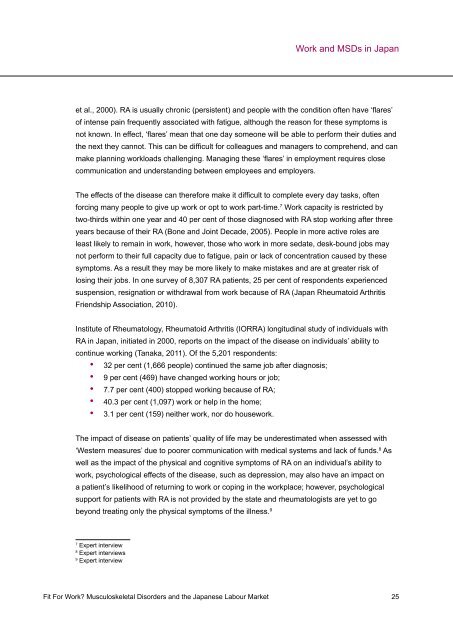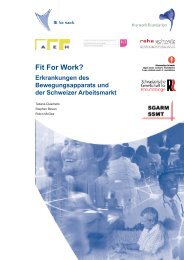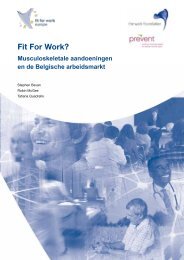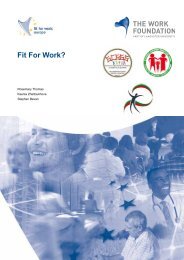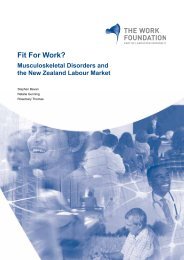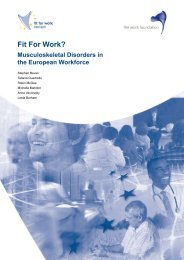English version - Fit for Work Europe
English version - Fit for Work Europe
English version - Fit for Work Europe
You also want an ePaper? Increase the reach of your titles
YUMPU automatically turns print PDFs into web optimized ePapers that Google loves.
et al., 2000). RA is usually chronic (persistent) and people with the condition often have ‘flares’<br />
of intense pain frequently associated with fatigue, although the reason <strong>for</strong> these symptoms is<br />
not known. In effect, ‘flares’ mean that one day someone will be able to per<strong>for</strong>m their duties and<br />
the next they cannot. This can be difficult <strong>for</strong> colleagues and managers to comprehend, and can<br />
make planning workloads challenging. Managing these ‘flares’ in employment requires close<br />
communication and understanding between employees and employers.<br />
The effects of the disease can there<strong>for</strong>e make it difficult to complete every day tasks, often<br />
<strong>for</strong>cing many people to give up work or opt to work part-time. 7 <strong>Work</strong> capacity is restricted by<br />
two-thirds within one year and 40 per cent of those diagnosed with RA stop working after three<br />
years because of their RA (Bone and Joint Decade, 2005). People in more active roles are<br />
least likely to remain in work, however, those who work in more sedate, desk-bound jobs may<br />
not per<strong>for</strong>m to their full capacity due to fatigue, pain or lack of concentration caused by these<br />
symptoms. As a result they may be more likely to make mistakes and are at greater risk of<br />
losing their jobs. In one survey of 8,307 RA patients, 25 per cent of respondents experienced<br />
suspension, resignation or withdrawal from work because of RA (Japan Rheumatoid Arthritis<br />
Friendship Association, 2010).<br />
Institute of Rheumatology, Rheumatoid Arthritis (IORRA) longitudinal study of individuals with<br />
RA in Japan, initiated in 2000, reports on the impact of the disease on individuals’ ability to<br />
continue working (Tanaka, 2011). Of the 5,201 respondents:<br />
• 32 per cent (1,666 people) continued the same job after diagnosis;<br />
• 9 per cent (469) have changed working hours or job;<br />
• 7.7 per cent (400) stopped working because of RA;<br />
• 40.3 per cent (1,097) work or help in the home;<br />
• 3.1 per cent (159) neither work, nor do housework.<br />
The impact of disease on patients’ quality of life may be underestimated when assessed with<br />
‘Western measures’ due to poorer communication with medical systems and lack of funds. 8 As<br />
well as the impact of the physical and cognitive symptoms of RA on an individual’s ability to<br />
work, psychological effects of the disease, such as depression, may also have an impact on<br />
a patient’s likelihood of returning to work or coping in the workplace; however, psychological<br />
support <strong>for</strong> patients with RA is not provided by the state and rheumatologists are yet to go<br />
beyond treating only the physical symptoms of the illness. 9<br />
7 Expert interview<br />
8 Expert interviews<br />
9 Expert interview<br />
<strong>Work</strong> and MSDs in Japan<br />
<strong>Fit</strong> For <strong>Work</strong>? Musculoskeletal Disorders and the Japanese Labour Market 25


